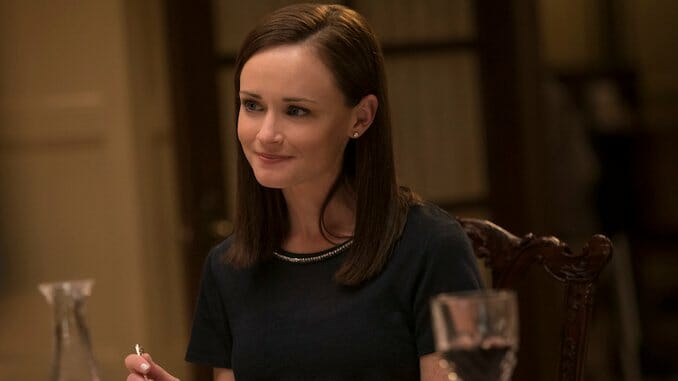Reconsidering Gilmore Girls: Does Rory Really Deserve Our Hate?
Lorelai actually gives the answer for why you hate Rory in the pilot.
Photo Courtesy of Netflix
Look, I can’t fault Rory Gilmore for going through, at 32, the kind of arrested development more suitable for a 22-year-old. But the timing of Gilmore Girls: a Year in the Life, combined with Rory’s burned-out “former gifted kid” energy made the character far less endearing to many. The problem is not just that Rory became an entitled and flailing freelance writer unable to live up to her childhood ambitions. Given that the Stars Hollow townies treated her like she was the second coming of Jesus, viewers took their word for it and automatically adored the bookish blue-eyed cherub from the start. When she starts behaving carelessly in the later seasons, it should be evidence that Rory may be happier with a different kind of life than the one she assumes Lorelai wants for her. Instead, she is judged by the standards of her teenage identity.
During Rory’s teen years, viewers watched Lorelai keep her in line, show her immense love, and try her best to make sure her daughter would never lack. Lorelai says throughout the series that Rory was a “perfect kid.” It wouldn’t surprise me if Rory caught on to the circumstances and tension surrounding her birth early on and spent the rest of her childhood justifying her own existence by proving that Lorelai’s sacrifices were worthy. Sensing that underlying fear and not wanting Rory to see herself as a burden, Lorelai constantly impresses on Rory that she is so needed as a daughter, locking them into a codependent relationship that impacts every choice they make.
Amy Sherman-Palladino set up parallels between Rory and Lorelai by giving them the same name and treating Rory like a vessel for Lorelai’s unfulfilled ambitions. In the first episode, when Rory gets into Chilton, Lorelai jokes to Sookie: “She can finally go to Harvard like she’s always wanted and get the education that I never got and get to do all the things that I never got to do and then I can resent her for it and we can finally have a normal mother-daughter relationship.”
When Rory hesitates to enroll in Chilton because she wants to see more of Dean (a guy she just met), Lorelai suspects right away, saying “God, I’m so dense. That should’ve been my first thought. After all, you’re me … Someone willing to throw important life experiences out the window to be with a guy? Sounds like me to me.”
Rory denies both being her mother and being swayed by the boy, but the pilot lays down the groundwork for Lorelai overly-identifying with Rory. Of course Rory is snarky and witty, since it’s the lingua franca of her household and entire town. But as much as she admires her mom, Rory can’t replicate her mother’s spitfire personality—partially because someone needs to be the mediating force, and partially because Rory feels most at home watching Marx Brothers and eating Chinese takeout on the couch. Lorelai tells her at 15, “You’ve always been the sensible one in this house.”
Lorelai knows that Rory’s birth was faced with opposition. In a Season 3 flashback from “Dear Emily and Richard,” she and Christopher overhear Christopher’s father Straub suggest to Emily and Richard that Lorelai have an abortion because it isn’t fair that Christopher should “sacrifice” his future. Lorelai’s parents disagree, yet when Rory meets her paternal grandparents for the first time it becomes clear that Straub’s opinion has not changed. That episode (“Christopher Returns”) likely confirms Rory’s greatest fear. It doesn’t matter how good of a student she is, how beloved she is by her community, or how hard she tries to mend the relationship between her mom and grandparents; her existence ruined her parents’ lives.
Rory can’t be expected to redeem Lorelai and Christopher’s mistakes and be her own person. She likes to be quietly competent and, much like Christoper, seeks the path of least resistance. Rory’s adult years, starting at Yale, present an existential challenge during which she tries to live a life by following her will, which is still muddled by leftover obligations towards her family.